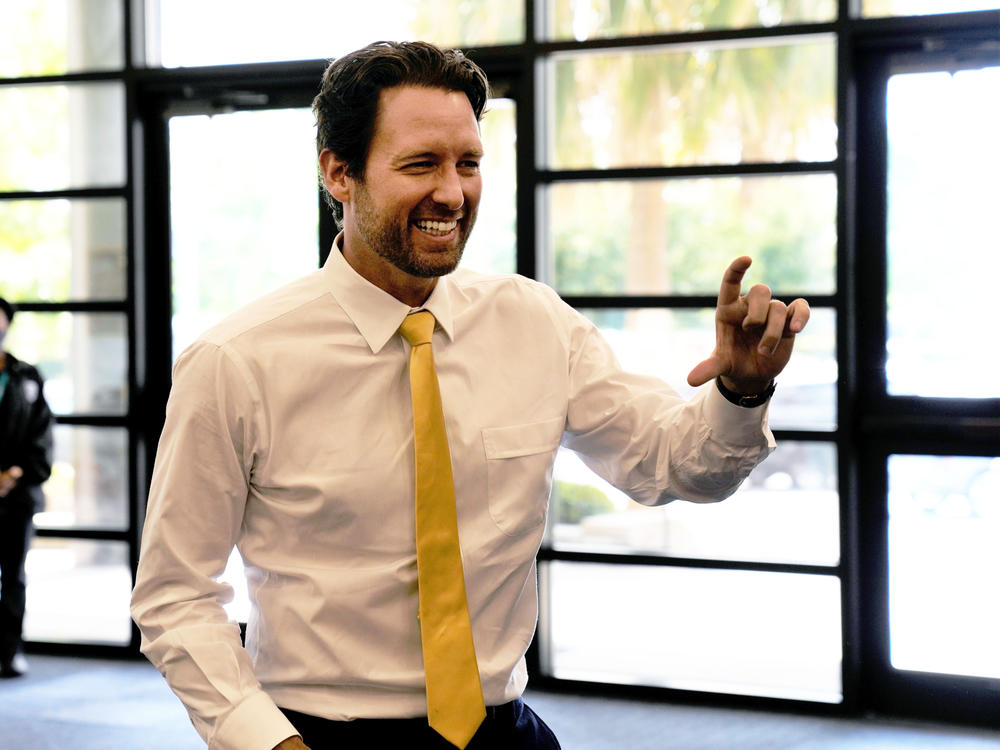Section Branding
Header Content
Democrat Joe Cunningham to face Republican Henry McMaster in S.C. race for governor
Primary Content
Updated June 14, 2022 at 10:27 PM ET
In South Carolina, former Congressman Joe Cunningham has won the Democratic primary for governor, according to a call by The Associated Press.
Cunningham will face incumbent Republican Gov. Henry McMaster in November who also won his Tuesday primary, according to the AP.
Voters in the deep-red state haven't elected a Democratic governor in nearly 25 years, but Cunningham has a history of upsetting the political status quo. In 2018, he flipped the state's 1st Congressional District red to blue. His tenure lasted only one term before losing to Republican Congresswoman Nancy Mace. For some, though, it's a sign that Cunningham can win against Republicans in South Carolina.
Defeating McMaster in November will be a challenge, to say the very least. He's been endorsed by former President Donald Trump and remains popular in the state where Republicans control both houses of the state legislature, both U.S. Senate seats and six out of seven seats in Congress.
"I can tell you it's gonna be a tough race," Cunningham said at a Democratic debate Friday, "but I can tell you that I am up for that challenge."
Last week, Vice President Kamala Harris appeared at a party fundraiser in Columbia, S.C., and gave Democratic voters and candidates alike an enthusiasm jolt. "Let us fight to get Democrats up and down state ballots," she said.
McMaster was the state's lieutenant governor and assumed the office of governor in early 2017 after former President Donald Trump nominated then-Gov. Nikki Haley as ambassador to the United Nations.
When it comes to the issues heading into November, Cunningham and McMaster couldn't be further apart:
Health care
A top issue for Cunningham is Medicaid expansion. South Carolina is one of just 12 states — most of which are in the south — that have not expanded Medicaid to individuals up to 138% of the Federal Poverty Level, or $17,774 for an individual in 2021. Doing so in South Carolina would insure approximately 100,000 additional people, according to the Kaiser Family Foundation.
Republicans, including Gov. McMaster, have spent years holding out against expansion. "Expanding Medicaid would cost the state hundreds of millions of dollars every year," the governor wrote on Twitter last year, "and I will fight any effort to do it here."
Abortion
South Carolina has a six-week abortion ban waiting in the wings if Roe v. Wade is overturned. After receiving McMaster's signature, the law was quickly blocked by a federal court and is awaiting a decision from the U.S. Supreme Court.
After the draft opinion showing justices were leaning towards reversing Roe leaked from the high court last month, Democrats moved to make abortion a central issue of their campaigns in South Carolina. Cunningham released this ad. "The stakes in this election could not be higher," he says in the video, "because these healthcare decisions should be between women and their doctors."
Guns
The primary election falls seven years — nearly to the day — after nine Black church-goers were killed by a domestic terrorist in Charleston in a racially motivated mass murder.
Gun rights remain a key campaign issue for McMaster, who is endorsed by the National Rifle Association. Just last year, the governor signed a law allowing South Carolinians to openly carry their firearms, even with some law enforcement hesitation.
"Our gun violence is out of control," Cunningham said at the Democratic debate last week, touting his record of helping to push gun control legislation through the U.S. House.
LGBTQ students
This year, Gov. McMaster quietly signed a bill into law that prevents transgender students from playing girls' or women's sports.
At Friday's debate, Cunningham said that the issue should be dealt with using "compassion" and "empathy," emphasizing the importance of looking after kids' mental health.
"We need to care for our kids and send a clear message to our politicians to leave our kids alone," he said.
Acacia Squires is NPR's state government editor.
Copyright 2022 NPR. To see more, visit https://www.npr.org.
Bottom Content

